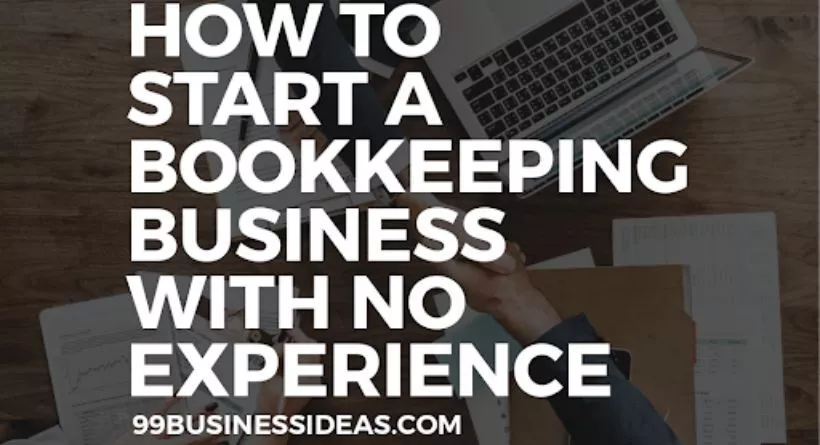Here’s what we’ll cover:
- Your business plan
- Your certifications
- Your business structure
- Your niche
- Your unique value proposition
- Your target market
- Your business name
- Your services
- Your software
- Your finances
- Your insurance
- Your paperwork and other procedures
- Your employees
- Your marketing
- Your continued education
Can I start a bookkeeping business with no experience?
Essential Qualifications for Starting a Bookkeeping Business: CPA or Bookkeeping Experience and Certification Required. In-Depth Knowledge of Accounting Software, Best Practices, Laws, and Tax Codes is a Must. As a Bookkeeping Company, Your Clients Rely on Your Expertise to Provide Reliable and Accurate Services. Even Small Errors in Bookkeeping Can Lead to Financial Disaster. Don’t Risk It – Ensure Your Bookkeeping Business is Equipped with the Knowledge and Certification Needed for Success.
Unlock the Door to Starting Your Own Bookkeeping Business – Even Without Experience! Gain 1-3 Years of On-The-Job Work Experience and Earn Valuable Certifications Before Launching Your Business. Already a CPA or Professional Bookkeeper? Then You’re Ready to Take the Next Step! Our Guide Will Help You Start Your Bookkeeping Business and Achieve Success.
1) Start with a business plan
Create Your Business Roadmap to Success with a Well-Crafted Business Plan. This Document Will Help You Make Informed Decisions and Work Toward Your Goals, Organize Market Research, and Define Your Target Market, Marketing Strategy, and Cash Flow Projections. Essential for Financing from Banks or Investors, Your Business Plan Shows That You Understand Your Industry, Your Business Objectives, and Your Plan for Continued Growth. Don’t Start Your Bookkeeping Business Without It.
Follow These Steps to Create a Winning Business Plan for Your Bookkeeping Business:
- Executive Summary: Give a brief overview of your bookkeeping business, its purpose, and your main goals.
- Overview: Explain why you are starting this business, its structure, and the unique value that your bookkeeping business brings to the market.
- Industry Analysis: Outline your market research and the results. Discuss the likelihood of success for a bookkeeping company in your area, market trends, level of opportunity, and potential market share.
- Competitive Analysis: Analyze your competitors, their strengths and weaknesses, and what makes your bookkeeping business different.
- Marketing: Develop a comprehensive marketing strategy that will help you reach your ideal clients, generate leads, define your brand in the market, and close deals.
- Management: Demonstrate your experience in the industry and leadership, showing why you are a strong bookkeeping business owner and a good investment.
- Operations Plan: Define your day-to-day operations and explain the systems you will put in place to ensure your business functions optimally.
- Financials: Project how your bookkeeping business will generate cash flow, and its ability to grow over time, and estimate your expenses (including startup costs), revenues, and projected profits for the first five years of your business. A solid business plan with a detailed financial analysis is key to securing financing from banks or investors and setting your bookkeeping business on the path to success.
2) Earn your certifications
Looking to increase your credibility and authority in the bookkeeping industry? Certifications can help. Whether you’re a seasoned professional or just starting, obtaining certifications in bookkeeping and accounting software can boost your skills and enhance your brand. By showcasing your expertise through certifications, you can differentiate yourself from competitors and attract more clients to your business.
Bookkeeper certifications
American Institute of Professional Bookkeepers (AIPB): Get certified by the American Institute of Professional Bookkeepers (AIPB) and boost your bookkeeping credentials. With the CB designation (Certified Bookkeeper) behind your name, you’ll have additional authority and credibility with clients. To obtain this certification, you must complete a 3,000-hour work experience requirement and pass the AIPB certification exam. If you lack formal education or experience in bookkeeping or accounting, the AIPB certification is the right choice for you.
National Association of Certified Public Bookkeepers (NACPB): If you want to boost your bookkeeping skills and add more credibility to your brand, the NACPB certification is worth considering. Unlike AIPB, this certification requires you to complete courses in accounting, payroll, QuickBooks, and bookkeeping. You must pass an exam for each of these courses to earn the CPB (Certified Professional Bookkeeper) credential. If you’re a beginner, you need one year of on-the-job experience before you can apply for this certification. Once certified, you can proudly display CPB after your name, signifying your expertise and commitment to the field.
Software certifications
QuickBooks ProAdvisor: Get ahead of your competition and gain the trust of potential clients by earning a QuickBooks certification, the most widely used accounting software in the industry. QuickBooks Online certification is free and accessible, but for QuickBooks Desktop certification, the software must be purchased for $449 annually. Stand out in the market and showcase your expertise by certifying with QuickBooks.
FreshBooks Partner Program: FreshBooks is a highly popular accounting software option for service-based businesses. If you plan to cater to this market, getting certified with FreshBooks can work wonders for your business. Accountants can enroll in their partnership program, which offers comprehensive training in addition to certification.
Xero Partner Program: Looking for affordable accounting software that’s comparable to QuickBooks? Consider Xero, a lesser-known but cost-effective option. Despite being less well-known, Xero has proven to be a reliable and efficient accounting software. Some companies even prefer to work with Xero. Getting certified in Xero could be a wise decision, as it may open up more opportunities for you and your business.
IRS Enrolled Agent: Are you interested in providing tax return services to clients but not a certified public accountant (CPA)? Consider obtaining the necessary certification. This certification requires passing an initial exam and completing a specific number of continuing education credits every three years. With this certification, you can expand your services and cater to the needs of your clients with confidence and credibility.
3) Choose a business structure
Choosing the right business structure is crucial to achieving your business goals. The four main types of business structures include sole proprietorship, limited liability company (LLC), partnership, and corporation. The ideal business structure for you depends on factors such as whether you want to raise capital and how much personal liability you want to take on.
For bookkeepers starting, a sole proprietorship is a popular choice unless they plan to hire additional employees. As your business grows, consider switching to an LLC or corporation model.
Once you have decided on a business structure, it’s important to take the necessary steps to register your business as soon as possible. This ensures that you can start operating legally and avoid any penalties.
4) Find your niche
Determining your niche is crucial to the success of your business. Conducting thorough market research and leveraging your skills and expertise can help you identify a clear and specific direction for your business. Your niche doesn’t have to be too narrow; it can be as simple as serving local businesses with a small team or companies with a completely remote workforce.
Remember that your niche can evolve as you gain more experience and understand which types of clients you enjoy working with and who appreciate your services. Refining your niche can help you attract the right clients and stand out in a crowded market.
5) Uncover your unique value proposition (UVP)
Creating a compelling unique value proposition (UVP) requires careful analysis of your competitors, your target audience’s needs, and your unique combination of hard and soft skills. By understanding what sets you apart from others in your industry and what your ideal clients are looking for, you can craft a UVP that resonates with them and effectively communicates the value you bring to the table.
Consider the following questions when determining your UVP:
- What makes you different from all the other bookkeeping businesses in your area?
- What do you offer that clients won’t get from larger bookkeeping firms?
- What specific problem do you solve for your clients beyond basic bookkeeping?
- Do you have a particular industry you understand through and through?
- What are your strengths as a bookkeeper? Are you supremely meticulous and time-efficient (very important to a prospective client during tax season)? Do you offer a more personable approach to your work?
Don’t worry about finding the perfect UVP for your business, as it can evolve. However, it’s important to identify a UVP that resonates with you and effectively communicates your unique value proposition. Once you’ve determined your UVP, make sure to incorporate it into all your marketing efforts, including your website, business cards, and other promotional materials. Consistently repeating your UVP can help establish your brand identity and attract potential clients who align with your values.
6) Define your target market
Conducting thorough research can help you identify the types of clients that align with your financial goals and can afford your services. It’s important to target clients whose needs align with your unique value proposition and expertise. Developing a clear understanding of your target market, niche, and UVP simultaneously can help you refine each aspect and ensure they are aligned with each other.
By focusing on your target market, you can attract the right clients and create a sustainable business model that generates revenue and aligns with your goals.
7) Pick your business name
Your business name needs to be:
- Easy to remember
- Clear
- Identifiable
- Reflective on the service you provide
Choosing the right business name is crucial for creating a memorable brand identity. Avoid long, complex, or overly clever names that are difficult to remember. If you’re struggling to come up with a name, consider using a business name generator to spark your creativity.
When selecting a business name, it’s important to ensure that the domain name is available for your website. You don’t want to invest time and resources into a name that’s already taken.
Once you’ve decided on a name, secure the matching domain name, business email address, and social media handles for any platform you plan to use. Consistent branding across all channels can help establish your business’s identity and make it easier for customers to find you.
8) Design your service menu
When developing your service offerings, it’s essential to consider both your client’s needs and your own skill set. Start with a focused list of services and expand as necessary to meet demand.
Determining the appropriate pricing for your services is crucial for the success of your business. Consider the following factors when setting your rates:
- The value of your services compared to your competitors
- The complexity and level of expertise required for each service
- Your own expenses and overhead costs
- Your target market and their budget constraints
By carefully considering these factors, you can set fair and competitive rates that attract clients while ensuring profitability for your business.


